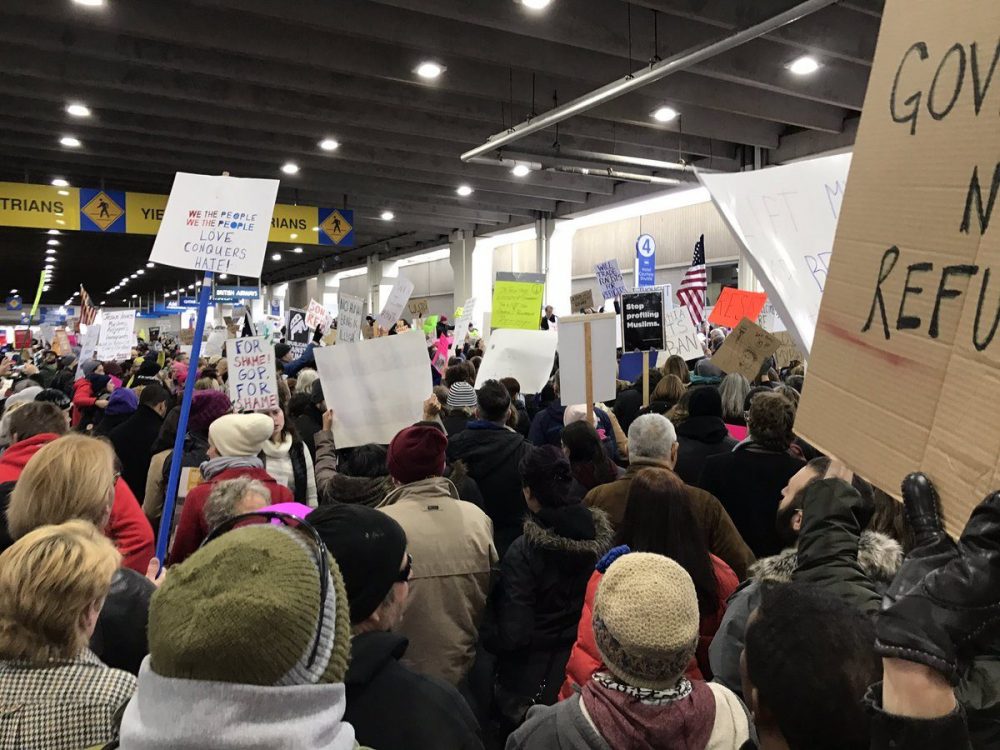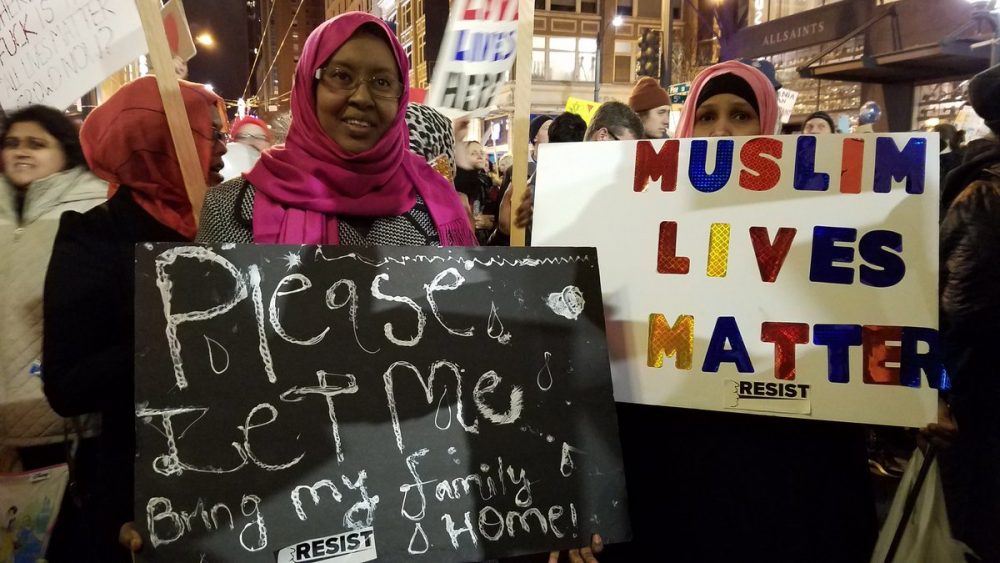Trump dismisses international controversy, fires acting AG.
UPDATE:
As Trump keeps tweeting about it, remember it was ONLY a week ago #SallyYates was fired for asserting what 27 judges have since ruled. pic.twitter.com/Q00HUiCrQy
— Victoria Brownworth (@VABVOX) February 6, 2017
On January 28, the New York Daily News cover depicted the Statue of Liberty weeping with the headline “Closing the Golden Door” – a reference to the Emma Lazarus poem “The New Colossus” that was engraved in bronze and attached to the pedestal of the Statue of Liberty in New York harbor in 1903.
The lines we are most familiar with read:
“Give me your tired, your poor,
Your huddled masses yearning to breathe free,
The wretched refuse of your teeming shore.
Send these, the homeless, tempest-tost to me,
I lift my lamp beside the golden door!”
That golden door slammed shut on January 27, which was, coincidentally or not, Holocaust Memorial Day. That day links to a dark history for America, which in 1939 turned Jewish refugees away from New York harbor. Most of those refugees were murdered in the Holocaust at various concentration camps, including Auschwitz and Bergen-Belsen. One well-known family that applied for refugee status was that of Anne Frank. She and her sister Margot and mother Edith would perish in the camps. Only her father, Otto, who would later publish the journal she kept, survived.
Today millions have read The Diary of Anne Frank and it continues to be required reading in American schools.
The last American ban against refugees sent #AnneFrank, her sister & parents to #Auschwitz to die.#MuslimBanpic.twitter.com/YQdopD6CNK
— Victoria Brownworth (@VABVOX) January 29, 2017
The memory of Frank and other refugees whose lives could have been saved by America was the ugly shadow behind President Trump as he signed an executive order referred to as the “Muslim ban” – a restriction on all people coming into America from seven predominantly Muslim countries: Syria, Iraq, Iran, Sudan, Yemen, Somalia, Libya. The ban also covers anyone holding dual citizenship with banned countries, thus impacting people in the U.K., Australia and other nations the U.S. previous considered allies.
Canadian Prime Minister Justin Trudeau offered sanctuary to people turned away from the U.S. while German Chancellor Angela Merkel, who has accepted over a million immigrants into Germany over the past two years alone, expressed her outrage over the ban in a statement Jan. 30.
Trump’s own rationale for the ban was delivered on Twitter:
There is nothing nice about searching for terrorists before they can enter our country. This was a big part of my campaign. Study the world!
— Donald J. Trump (@realDonaldTrump) January 30, 2017
Trump and his interlocutors have insisted this is merely a temporary 90-day travel ban and not a ban on Muslims, but since Trump noted that Christians from these countries would be exempted because he claimed hundreds of thousands of Christians were being beheaded by ISIS, that’s a difficult assertion to make. What’s more, Syrian refugees are in dire need of help from the U.S. Refusing them entry is remarkably similar to the 1939 ban on Jewish refugees.
Like the U.K.’s Brexit vote, which was largely justified as keeping Syrian and other immigrants out of the U.K., Trump campaigned on fear of immigrants. His opening salvo as a candidate insisted that Mexicans were “rapists” and were coming to the U.S. in large numbers basically to rape and kill.
Trump also claimed former-President Obama and former-Secretary of State Hillary Clinton were allowing “hundreds of thousands” of Middle Eastern immigrants into the U.S. This false claim was repeated by candidate Trump in stump speeches and in debates. But in point of fact, it’s the Department of Homeland Security that determines visas and vetting of immigrants, not the State Department.
Even Hillary Clinton, who has been attempting to remain off the main stage as is demanded of losing candidates, felt compelled to weigh in on the protests:
I stand with the people gathered across the country tonight defending our values & our Constitution. This is not who we are.
— Hillary Clinton (@HillaryClinton) January 29, 2017
Yet Trump has blamed Clinton for what he considers an unsafe America where hundreds of thousands of immigrants from Muslim nations are plotting against America. As a candidate he repeatedly said, including in a statement after the Pulse nightclub massacre in June 2016, “Under the Clinton plan, you’d be admitting hundreds of thousands of refugees from the Middle East with no system to vet them, or to prevent the radicalization of the children and their children.”
This was totally false, yet in a news segment on CNN’s Anderson Cooper 360, on Jan. 30, Trump voters in Luzerne County, Pennsylvania–white men and women who had voted for Obama in 2009 but voted for Trump in 2016, cited his stance on keeping out Syrian and other refugees versus Clinton’s plan to admit them with full vetting (which takes at least two years), as their main rationale for voting Trump over Clinton.
The other part is Trump’s inability to control his impulses or think things through prior to acting – something we see on his Twitter feed daily. Had Trump waited for Sen. Jeff Sessions (R-AL), his nominee for Attorney General, to be confirmed by the Senate prior to issuing his executive order banning immigrants from these seven Muslim nations, there may have been little protest.
But that’s not what happened. Instead the president decided late Friday afternoon to sign the ban, clearly believing doing so right before the weekend would go unnoticed by press and populace alike.
 It did not.
It did not.
As with most of Trump’s actions since his inauguration on Jan. 20, signing the travel ban was ill-conceived and impulsive. Protests erupted immediately, and Saturday, when people began to be either detained or turned away at airports throughout the country, including legal permanent residents (LPRs) – people with green cards – chaos reigned.

On Saturday night, after the ACLU got involved, Ann M. Donnelly, a federal judge in Brooklyn, issued an emergency stay against the Muslim ban. This allowed people who had valid visas and had already landed in the U.S. to remain. It also protected those in the air after the judge’s stay was issued. It did not, however, help those who had been sent back either in mid-air or from airports in Philadelphia and elsewhere.
Saturday night and all day Sunday and Monday were marked by protests erupting at airports and city halls across the country, even in red states like Nebraska, Iowa and Vice President Mike Pence’s home state of Indiana. The largest protests on Saturday and Sunday were held at JFK airport in New York, PHL airport in Philadelphia and Seattle’s Westlake Park. At Dulles International Airport in Virginia, officials were refusing to follow the stay of the ban on Sunday, Jan. 29, creating further conflict and a possible constitutional crisis, as the executive branch has no constitutional ability to override the other two branches of government.

Conflict and chaos was exacerbated on Monday Jan. 30, when at 9 p.m.EST, Trump fired the acting Attorney General, Sally Yates. Yates, an appointee of Barack Obama, was an ostensible placeholder while the Senate held hearings on Sessions.
Sessions is the most controversial of all Trump’s nominees, with a long history of racism that kept him from being appointed to the federal bench under Ronald Reagan’s presidency in 1986. Sessions was the only Reagan appointee to be rejected. Sessions is so controversial, members of Congress, including civil rights icon Rep. John Lewis (D-GA), testified against Sessions at the Senate hearings.
Yet despite the protests and the confusion at airports which had officials in tears, visa-holders in agony and small children abandoned at airports, unable to be picked up by their families, Trump insisted all was moving smoothly. In concurrent tweets Monday morning Trump wrote:
Only 109 people out of 325,000 were detained and held for questioning. Big problems at airports were caused by Delta computer outage,…..
— Donald J. Trump (@realDonaldTrump) January 30, 2017
and
protesters and the tears of Senator Schumer. Secretary Kelly said that all is going well with very few problems. MAKE AMERICA SAFE AGAIN!
— Donald J. Trump (@realDonaldTrump) January 30, 2017
Trump’s rather bullying reference to Senate Minority Leader Chuck Schumer’s (D-NY) emotional response to the ban utterly ignored the reality of the protests and the outrage within both the Democratic side of Congress and his own State and Justice Departments.
Enter Sally Yates, acting Attorney General, being hailed by those on the left as the one identifiable hero. Yates had sent a letter to the Justice Department asserting that she did not believe the Muslim ban was constitutional and that they were not to enforce it. She ordered everyone working in the Justice Department to refuse to defend Trump’s executive order in court.
Yates’ letter reads in part: “I am responsible for ensuring that the positions we take in court remain consistent with this institution’s solemn obligation to always seek justice and stand for what is right. At present, I am not convinced that the defense of the executive order is consistent with these responsibilities nor am I convinced that the executive order is lawful.”
Yates said, “For as long as I am the acting attorney general, the Department of Justice will not present arguments in defense of the executive order, unless and until I become convinced that it is appropriate to do so.”
That act of courage lasted just as long as it took Trump and his team to find someone in the Justice Department to take her place – Dana Boente, another Obama administration appointee who agrees with Trump on the ban.
This is why acting AG #SallyYates was fired. pic.twitter.com/timfptKFIz
— Victoria Brownworth (@VABVOX) January 31, 2017
But there are problems. In firing Yates in another impulsive move, Trump may have put the nation at risk. Boente is not, unlike Yates, approved by the Senate and there are conflicting points of view on whether or not he has the power to sign surveillance warrants. The New York Times quoted senior Justice Department officials saying no, but at 11 p.m. EST Jan. 30, Lawfare disagreed.
What’s remarkable over the period between Friday afternoon and Monday night is how much drama and turmoil have arisen in this brief 11 days of the Trump presidency. That turmoil has put America in a highly precarious position with friend and foe alike.
Congressional Democrats lead protest outside Supreme Court against “unconstitutional and immoral” immigration order. https://t.co/YCwb7C76Dl pic.twitter.com/wIQuRHuwDd
— ABC News (@ABC) January 31, 2017
That should concern all Americans, but the nuances of the Muslim ban seem to be lost on many. Even among Democrats, the percentage of Americans who favor keeping Middle Eastern immigrants out is depressingly high – well over half the country agrees with the concept.
But seeing families torn apart at airports may have a different effect in the coming days and weeks – it’s impossible to say. Refugees fleeing to America from the nations on Trump’s list are mostly fleeing for their lives and have spent inordinate time and money trying to obtain visas to get here.
People who aided our military throughout the Iraq war are now being turned away. This is, of course, unconscionable. Whether it is also unconstitutional – the president has broad leeway to restrict people from entering the country – remains to be seen.
The last time an attorney general was fired in the U.S. was during the Nixon administration. During the Watergate scandal, which forced Richard Nixon to resign, the so-called “Saturday Night Massacre” took place on October 20, 1973. Nixon fired Special Prosecutor Archibald Cox and accepted the resignations of Attorney General Elliot Richardson and Deputy Attorney General William Ruckelshaus.
Regarding the firing of Yates, the White House stated that in “refusing to enforce a legal order designed to protect the citizens of the United States, [Yates] has betrayed the Department of Justice.”
Yet she was upholding the Constitution, which was, in fact, her job.
According to White House press secretary Sean Spicer, Dana Boente, US attorney for the Eastern District of Virginia, was sworn in at 9 p.m. EST.
It’s difficult to assess what happens next with regard to the Muslim ban or any other executive order signed by Trump in the coming weeks and days. The president has done exactly what he said he would do as a candidate on the campaign trail. Those campaign promises, outrageous as many of us knew them to be, may shatter our Constitution and the democracy it upholds. For his part, Trump summed it all up in a tweet:
If the ban were announced with a one week notice, the “bad” would rush into our country during that week. A lot of bad “dudes” out there!
— Donald J. Trump (@realDonaldTrump) January 30, 2017
For the rest of us, it will take far more than a tweet to explain what is happening to ourselves, our families or our children.
This is who #MuslimBan is keeping out of America.
Explain THAT to your kids.pic.twitter.com/jJl2XyIIhe— Victoria Brownworth (@VABVOX) January 29, 2017
